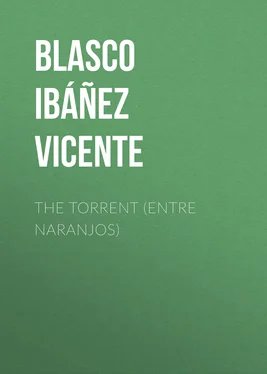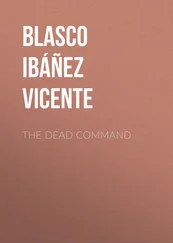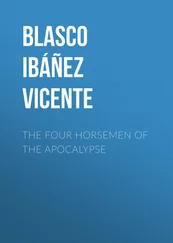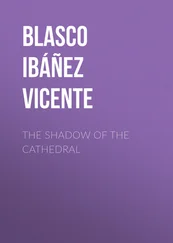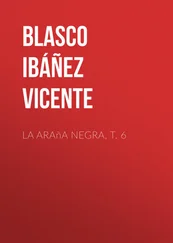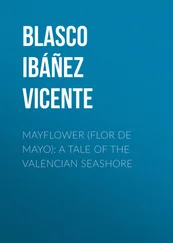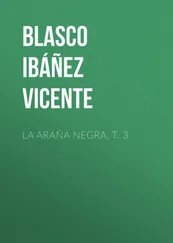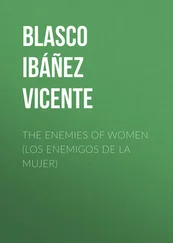Vicente Blasco Ibáñez - The Torrent (Entre Naranjos)
Здесь есть возможность читать онлайн «Vicente Blasco Ibáñez - The Torrent (Entre Naranjos)» — ознакомительный отрывок электронной книги совершенно бесплатно, а после прочтения отрывка купить полную версию. В некоторых случаях можно слушать аудио, скачать через торрент в формате fb2 и присутствует краткое содержание. Жанр: foreign_prose, foreign_antique, на английском языке. Описание произведения, (предисловие) а так же отзывы посетителей доступны на портале библиотеки ЛибКат.
- Название:The Torrent (Entre Naranjos)
- Автор:
- Жанр:
- Год:неизвестен
- ISBN:нет данных
- Рейтинг книги:4 / 5. Голосов: 1
-
Избранное:Добавить в избранное
- Отзывы:
-
Ваша оценка:
- 80
- 1
- 2
- 3
- 4
- 5
The Torrent (Entre Naranjos): краткое содержание, описание и аннотация
Предлагаем к чтению аннотацию, описание, краткое содержание или предисловие (зависит от того, что написал сам автор книги «The Torrent (Entre Naranjos)»). Если вы не нашли необходимую информацию о книге — напишите в комментариях, мы постараемся отыскать её.
The Torrent (Entre Naranjos) — читать онлайн ознакомительный отрывок
Ниже представлен текст книги, разбитый по страницам. Система сохранения места последней прочитанной страницы, позволяет с удобством читать онлайн бесплатно книгу «The Torrent (Entre Naranjos)», без необходимости каждый раз заново искать на чём Вы остановились. Поставьте закладку, и сможете в любой момент перейти на страницу, на которой закончили чтение.
Интервал:
Закладка:
The recluse, in hopes of a perquisite, led the two women toward the door of the hermitage, where his wife and daughter had appeared, to feast their eyes on the huge diamonds sparkling at the ears of the strange lady.
"Enter, siñorita " the rustic invited. "I'll show you the Virgin, the Virgin del Lluch , you understand, the only genuine one. She came here alone all the way from Majorca. People down in Palma claim they have the real Virgin. But what can they say for themselves? They are jealous because our Lady chose Alcira; and here we have her, proving that she's the real one by the miracles she works."
He opened the door of the tiny church, which was as cool and gloomy as a cellar. At the rear, on a baroque altar of tarnished gold, stood the little statue with its hollow cloak and its black face.
Rapidly, by rote almost, the good man recited the history of the image. The Virgin del Lluch was the patroness of Majorca. A hermit had been compelled to flee from there, for a reason no one had been able to discover—perhaps to get away from some Saracen girl of those exciting, war-like days! And to rescue the Virgin from profanation he brought her to Alcira, and built this sanctuary for her. Later people from Majorca came to return her to their island. But the celestial lady had taken a liking to Alcira and its inhabitants. Over the water, and without even wetting her feet, she came gliding back. Then the Majorcans, to keep what had happened quiet, counterfeited a new statue that looked just like the first. All this was gospel truth, and as proof, there lay the original hermit buried at the foot of the altar; and there was the Virgin, too, her face blackened by the sun and the salt wind on her miraculous voyage over the sea.
The beautiful lady smiled slightly, as she listened. The maid was all ears, not to lose a word of a language she but half understood, her credulous peasant eyes traveling from the Virgin to the hermit and from the hermit to the Virgin, plainly expressing the wonder she was feeling at such a portentous miracle. Rafael had followed the party into the shrine and taken a position near the fascinating stranger. She, however, pretended not to see him.
"That is only a legend," he ventured to remark, when the rustic had finished his story. "You understand, of course, that nobody hereabouts accepts such tales as true."
"I suppose so," the lady answered coldly.
"Legend or no legend, don Rafael," the recluse grumbled, somewhat peeved, "that's what my grandfather and all the folk of his day used to say; and that's what people still believe. If the story has been handed down so long, there must be something to it."
The patch of sunlight that shone through the doorway upon the flagstones was darkened by the shadow of a woman. It was a poorly clad orchard worker, young, it seemed, but with a face pale, and as rough as wrinkled paper, all the crevices and hollows of her cranium showing, her eyes sunken and dull, her unkempt hair escaping from beneath her knotted kerchief. She was barefoot, carrying her shoes in her hand. She stood with her legs wide apart, as if in an effort to keep her balance. She seemed to feel intense pain whenever she stepped upon the ground. Illness and poverty were written on every feature of her person.
The recluse knew her well; and as the unfortunate creature, panting with the effort of the climb, sank upon a little bench to rest her feet, he told her story briefly to the visitors.
She was ill, very, very ill. With no faith in doctors, who, according to her, "treated her with nothing but words"; she believed that the Virgin del Lluch would ultimately cure her. And, though at home she could scarcely move from her chair and was always being scolded by her husband for neglecting the housework, every week she would climb the steep mountain-side, barefoot, her shoes in her hand.
The hermit approached the sick woman, accepting a copper coin she offered. A few couplets to the Virgin, as usual, he supposed!
"Visanteta, a few gochos !" shouted the rustic, going to the door. And his daughter came into the chapel—a dirty, dark-skinned creature with African eyes, who might just have escaped from a gipsy band.
She took a seat upon a bench, turning her back upon the Virgin with the bored ill-humored expression of a person compelled to do a dull task day after day; and in a hoarse, harsh, almost frantic voice, which echoed deafeningly in that small enclosure, she began a drawling chant that rehearsed the story of the statue and the portentous miracles it had wrought.
The sick woman, kneeling before the altar without releasing her hold upon her shoes, the heels of her feet, which were bruised and bleeding from the stones, showing from under her skirts, repeated a refrain at the end of each stanza, imploring the protection of the Virgin. Her voice had a weak and hollow sound, like the wail of a child. Her sunken eyes, misty with tears, were fixed upon the Virgin with a dolorous expression of supplication. Her words came more tremulous and more distant at each couplet.
The beautiful stranger was plainly affected at the pitiful sight. Her maid had knelt and was following the sing-song rhythm of the chant, with prayers in a language that Rafael recognized at last. It was Italian.
"What a great thing faith is!" the lady murmured with a sigh.
"Yes, señora ; a beautiful thing!"
Rafael tried to think of something "brilliant" on the grandeur of faith, from Saint Thomas, or one of the other "sound" authors he had studied. But he ransacked his memory in vain. Nothing! That charming woman had filled his mind with thoughts far other than quotations from the Fathers!
The couplets to the Virgin came to an end. With the last stanza the wild singer disappeared; and the sick woman, after several abortive efforts, rose painfully to her feet. The recluse approached her with the solicitude of a shopkeeper concerned for the quality of his wares. Were things going any better? Were the visits to the Virgin doing good?… The unfortunate woman did not dare to answer, for fear of offending the miraculous Lady. She did not know!… Yes … she really must be a little better … But that climb!… This offering had not had such good results as the previous ones, she thought; but she had faith: the Virgin would be good to her and cure her in the end. At the church door she collapsed from pain. The recluse placed her on his chair and ran to the cistern to get a glass of water. The Italian maid, her eyes bulging with fright, leaned over the poor woman, petting her:
" Poverina! Poverina!… Coraggio !" The invalid, rallying from her swoon, opened her eyes and gazed vacantly at the stranger, not understanding her words but guessing their kindly intention.
The lady stepped out to the plazoleta , deeply moved, it seemed, by what she had been witnessing. Rafael followed, with affected absent-mindedness, somewhat ashamed of his insistence, yet at the same time looking for an opportunity to renew their conversation.
On finding herself once more in the presence of that wonderful panorama, where the eye ran unobstructed to the very limit of the horizon, the charming creature seemed to breathe more freely.
"Good God!" she exclaimed, as if speaking to herself. "How sad and yet how wonderful! This view is ever so beautiful. But that woman!… That poor woman!"
"She's been that way for years, to my personal knowledge," Rafael remarked, pretending to have known the invalid for a long time, though he had scarcely ever deigned to notice her before. "Our peasants are queer people. They despise doctors, and refuse their help, preferring to kill themselves with these barbarous prayers and devotions, which they expect will do them good."
"But they may be right, after all!" the lady replied. "Disease is often incurable, and science can do for it about as much as faith—sometimes, even less.... But here we are laughing and enjoying ourselves while suffering passes us by, rubs elbows with us even, without our noticing!"…
Читать дальшеИнтервал:
Закладка:
Похожие книги на «The Torrent (Entre Naranjos)»
Представляем Вашему вниманию похожие книги на «The Torrent (Entre Naranjos)» списком для выбора. Мы отобрали схожую по названию и смыслу литературу в надежде предоставить читателям больше вариантов отыскать новые, интересные, ещё непрочитанные произведения.
Обсуждение, отзывы о книге «The Torrent (Entre Naranjos)» и просто собственные мнения читателей. Оставьте ваши комментарии, напишите, что Вы думаете о произведении, его смысле или главных героях. Укажите что конкретно понравилось, а что нет, и почему Вы так считаете.
